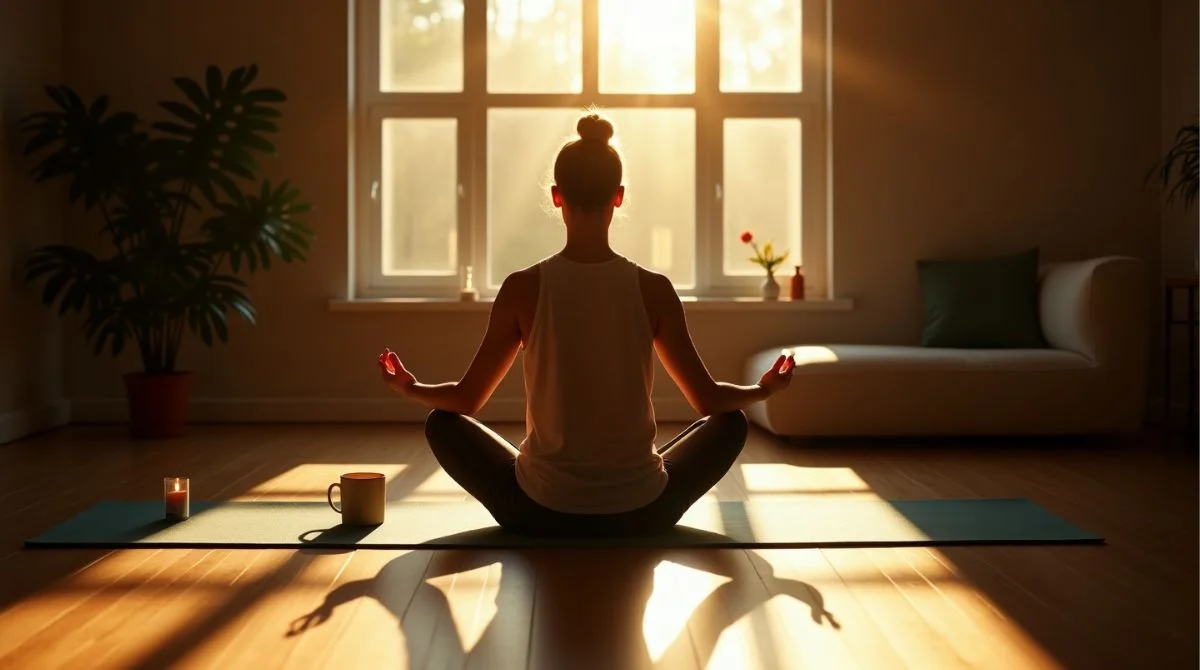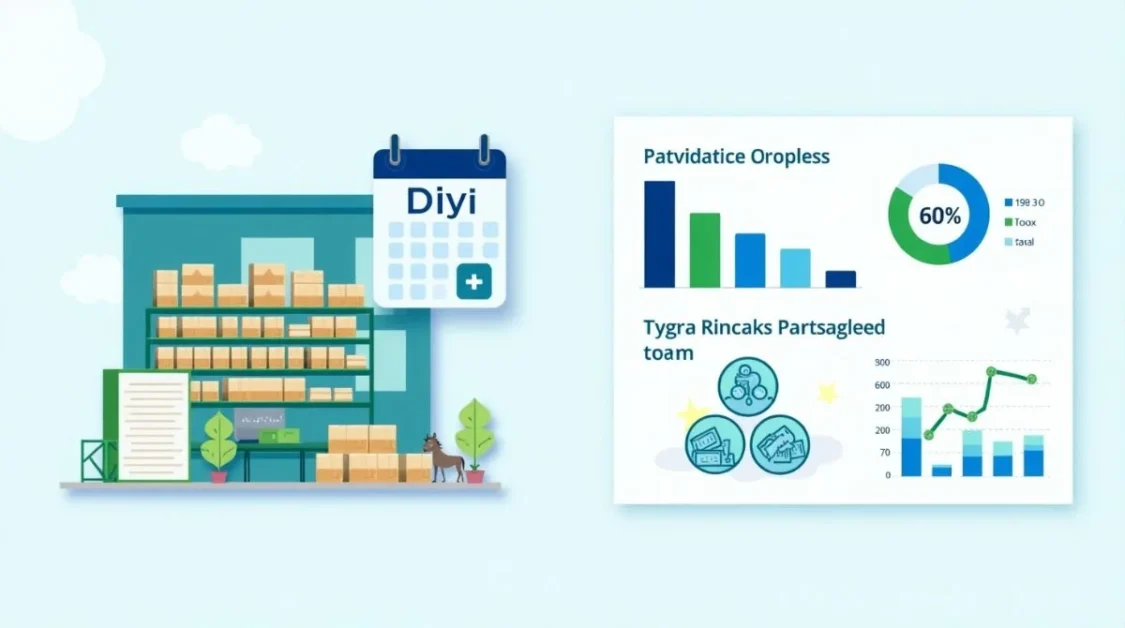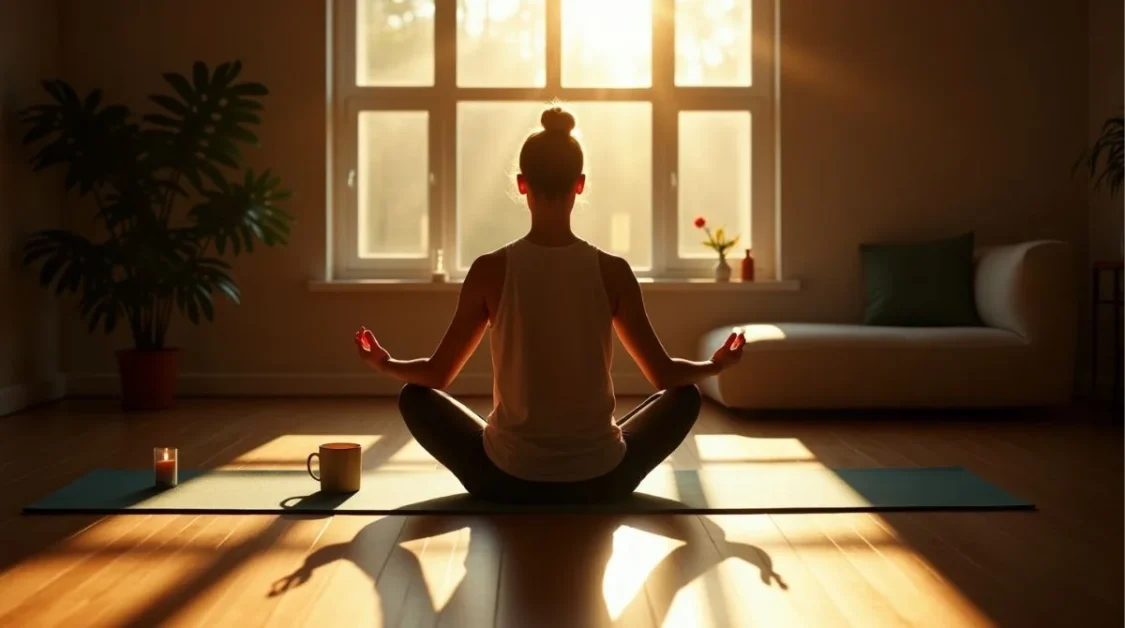What Is Morning Meditation?
Meditation is a practice where you focus your mind to achieve calm and clarity. Morning meditation happens right after waking, helping you start the day centered.
Benefits of Morning Meditation
1. Reduces Stress and Anxiety
Meditation activates the parasympathetic nervous system, which helps calm your body and mind. Just 10 minutes in the morning can lower cortisol levels, the hormone linked to stress.
2. Boosts Focus and Productivity
Starting your day with a clear mind helps you stay focused on tasks and make better decisions throughout the day.
3. Enhances Emotional Health
Regular meditation increases gray matter in the brain regions linked to emotion regulation. This leads to improved mood and better resilience.
4. Improves Sleep Cycles
A peaceful start to the day contributes to better sleep at night. Your nervous system learns to operate in a more balanced, restful state.
5. Creates a Positive Habit Loop
Starting your day with intention builds momentum. This daily ritual becomes a foundation for other healthy habits.
Types of Morning Meditation
Morning meditation isn’t one-size-fits-all. There are several types you can choose from depending on your personality, goals, and lifestyle. Here’s a closer look at the most popular types of morning meditation and how each one works:
1. Mindfulness Meditation
Mindfulness meditation involves sitting quietly and paying close attention to your breath, bodily sensations, and thoughts. The goal is not to clear your mind completely, but to observe your thoughts without judgment.
Why it’s great in the morning:
- Helps you tune into the present moment
- Reduces early morning anxiety
- Builds a foundation of calm for the day ahead
Example: Sit on a cushion or chair, close your eyes, and focus on your breathing for 5-10 minutes. If your mind wanders, simply bring your attention back to your breath.
2. Guided Meditation
Guided meditation uses an external voice (from an app, recording, or teacher) to lead you through the practice. It may include breath awareness, body scanning, or visualizations.
Why it’s great in the morning:
- Perfect for beginners
- Keeps your mind from wandering
- Adds structure to your practice
Example: Use an app like Headspace or Calm to listen to a 10-minute morning session focused on gratitude or positivity.
3. Loving-Kindness Meditation (Metta)
This type of meditation involves mentally sending goodwill, kindness, and warmth toward yourself and others. It helps build compassion and reduce negative emotions like anger and resentment.
Why it’s great in the morning:
- Sets a loving tone for your interactions
- Encourages emotional healing
- Boosts your mood and relationships
4. Body Scan Meditation
In a body scan, you slowly direct your attention to different parts of your body, noticing any tension, warmth, or sensations. It’s a great way to ground yourself and bring awareness to your physical presence.
Why it’s great in the morning:
- Helps you connect with your body
- Relieves physical tension from sleep
- Increases overall awareness and relaxation
Example: Start at the top of your head and mentally scan down to your toes, spending a few moments observing each area without trying to change anything.
5. Movement Meditation (Yoga, Tai Chi, Walking Meditation)
If sitting still isn’t your thing, try moving meditations. These combine gentle movement with focused breathing and awareness.
Why it’s great in the morning:
- Energizes your body while calming your mind
- Enhances flexibility and circulation
- Ideal for restless minds or bodies
Each of these methods offers unique benefits. The best part? You can mix and match them based on what you need each day.
How to Start a Morning Meditation Practice?
Getting started with morning meditation doesn’t require any fancy equipment or long hours. It’s about creating a simple and sustainable habit. Here’s a step-by-step guide to help you ease into your practice:
1. Set a Realistic Goal
Begin with a manageable time commitment. Even just 5 minutes of meditation each morning can bring noticeable benefits. As your comfort grows, you can gradually increase the duration.
2. Create a Peaceful Environment
Designate a quiet spot in your home where you won’t be disturbed. It could be a cozy corner of your room, a balcony, or even a comfy chair by the window. Light a candle, use a soft cushion, or play gentle background music to enhance the ambiance.
3. Choose a Meditation Style
Pick a style that suits your personality and goals whether it’s mindfulness, guided meditation, or movement-based. Experiment until you find what resonates with you.
4. Use a Timer or App
Set a timer so you’re not checking the clock. Apps like Calm, Headspace, or Insight Timer offer excellent beginner-friendly sessions and reminders.
5. Focus on Your Breath
Start by taking a few deep breaths. Breathe in slowly through your nose, hold for a moment, and exhale through your mouth. Let your breathing anchor you in the present moment.
6. Observe Without Judgment
Thoughts will arise that’s perfectly normal. The key is not to resist or engage with them. Gently bring your attention back to your breath or the focus of your meditation.
7. Build a Routine
Make meditation a part of your daily routine. Try doing it right after waking up or after brushing your teeth. Anchoring it to an existing habit increases the chances of it sticking.
8. Track Your Progress
Keep a journal or use an app to log your sessions. Reflecting on how you feel afterward can help you stay motivated and notice subtle improvements.
9. Be Kind to Yourself
Don’t expect perfection. Some days will be harder than others. What matters most is showing up consistently and being gentle with yourself throughout the process.
10. Invite Mindfulness Into Your Morning
Even after your session, carry that mindful presence into the rest of your morning whether you’re making breakfast, commuting, or planning your day. Let your meditation set the tone.Starting a morning meditation practice is one of the most empowering gifts you can give yourself. With patience and persistence, it can become a beloved ritual that shapes your energy.

Morning Meditation and Your Mental Health
Morning meditation is like a daily mental detox. It helps clear your mind, ease anxiety, and improve overall mental well-being. When you take time each morning to breathe deeply and focus inward, you activate your brain’s relaxation response. This simple habit reduces the production of stress hormones like cortisol and boosts mood-enhancing chemicals such as serotonin.
Key Benefits:
- Reduces symptoms of anxiety and depression
- Enhances emotional resilience
- Improves focus and clarity
Tips to Boost Mental Health:
- Use affirmations to start your day with positivity
- Practice gratitude by naming three things you’re thankful for
- Journal your thoughts after meditation to process emotions
Productivity and Focus Through Morning Meditation
Meditation primes your brain for peak performance. It trains your mind to maintain focus, reduce distractions, and stay on task. Just like physical exercise strengthens your muscles, meditation strengthens your ability to concentrate and stay present.
How It Helps:
- Sharpens attention and memory
- Reduces mental fatigue
- Increases work efficiency
Strategies to Enhance Productivity:
- Pair meditation with goal-setting or visualization
- Create a focused to-do list after meditating
- Use breathwork to reset during work breaks
Creative Flow and Inspiration
Morning meditation isn’t just for relaxation it’s a gateway to creativity. When your mind is calm and centered, new ideas flow more freely. Meditation quiets the mental noise that often drowns out inspiration.
Why It Works:
- Encourages a relaxed, open mindset
- Sparks imagination and new ideas
- Increases confidence in your creative instincts
Tips to Boost Creativity:
- Visualize a goal or project during your session
- Try meditating with music or nature sounds
- Use freewriting or sketching immediately afterward
Building a Family Morning Meditation Routine
Morning meditation isn’t just a solo practice it can be a beautiful family ritual. Even young kids can benefit from a few minutes of calm before the day begins. Families who meditate together often report better emotional connection and fewer morning meltdowns.
Why It’s Great for Families:
- Creates shared peaceful moments
- Teaches emotional regulation early
- Builds morning routines that stick
Easy Family Meditation Ideas:
- Practice deep breathing with kids using a “smell the flower, blow out the candle” method
- Try kid-friendly guided meditations from apps or YouTube
- Do a gratitude circle where each member shares one thing they’re thankful for
Real-Life Story:
Samantha, a mother of three, started a 3-minute morning meditation with her kids before school. Within weeks, mornings felt less chaotic, and her children began asking for “quiet time” even on weekends.
Morning Meditation Myths Debunked
Myth 1: You Need to Clear Your Mind Completely
Many believe morning meditation requires an empty mind, but that’s not true. Meditation is about observing thoughts, not erasing them. MyFastBroker’s meditation guides explain that it’s normal for your mind to wander. For example, Emma, a student, found peace by noticing her thoughts during a 10-minute session without forcing them away.
Myth 2: Meditation Takes Too Much Time
Some think meditation requires hours, but even 5 minutes works. Morning meditation fits busy schedules, especially for professionals like Mark, who meditates before work. MyFastBroker’s tips suggest starting small, ensuring you can meditate without disrupting your day.
Myth 3: You Need to Sit Cross-Legged
You don’t need to sit like a yogi to meditate. Any comfortable position sitting, lying down, or even standing works. MyFastBroker’s resources highlight flexibility, helping beginners like Lisa, a mom, meditate comfortably on her couch each morning.
Myth 4: Meditation Is Religious
Meditation isn’t tied to any religion; it’s a mental practice. Secular options like mindfulness are accessible to all. MyFastBroker’s articles clarify this, showing how anyone can benefit, like John, an atheist, who uses meditation for stress relief.
Myth 5: It’s Only for Calm People
Think you’re too stressed to meditate? That’s when it helps most. Morning meditation reduces anxiety, as seen with Sarah, a nurse, who calmed her nerves before shifts. MyFastBroker’s beginner guides encourage everyone to try, regardless of their emotional state.
Key Takeaways:
- Thoughts are okay; just observe them.
- Short sessions are effective.
- Meditate in any comfy position.
Tools and Apps for Morning Meditation in 2025
1. Why Use Meditation Tools?
Tools like apps and accessories enhance morning meditation, especially for beginners. They provide structure and guidance, making it easier to build a habit. MyFastBroker’s reviews highlight the best options for 2025, ensuring you find tools that fit your needs.
2. Top Apps for Morning Meditation
Apps offer guided sessions, timers, and calming sounds. MyFastBroker recommends:
- Headspace: Beginner-friendly with 5-minute morning sessions.
- Calm: Offers sleep stories and daily meditations.
- Insight Timer: Free, with thousands of guided tracks.
For example, Alex, a student, uses Calm’s morning meditation to focus before classes.
3. Wearable Devices
Smartwatches like Fitbit or Apple Watch track heart rate and stress during meditation. MyFastBroker’s guides explain how these devices help you monitor progress. Lisa, a professional, uses her Fitbit to ensure her 10-minute sessions lower her stress levels.
4. Accessories for Comfort
Simple tools like cushions or noise-canceling headphones improve your experience. MyFastBroker suggests affordable options, like a $20 meditation cushion for better posture. John, a retiree, found headphones made his morning meditation more immersive by blocking noise.
5. Choosing the Right Tool
With so many options, pick tools that match your goals. MyFastBroker’s comparison charts help you decide based on cost, features, and ease of use. Start with free apps and add accessories as you grow.
6. Tool Benefits:
- Apps guide beginners with ease.
- Wearables track meditation progress.
- Accessories boost comfort and focus.
Conclusion
Morning meditation is a simple yet profound way to take control of your mindset before the world grabs your attention. It helps you start each day with clarity, calm, and purpose and that energy influences everything you do afterward. Whether you have two minutes or twenty, this daily practice can transform your mornings and improve your overall well-being. The key is consistency, curiosity, and self-kindness.
Related Topic: Sungdayer Guide to a Mindful and Peaceful Sunday










